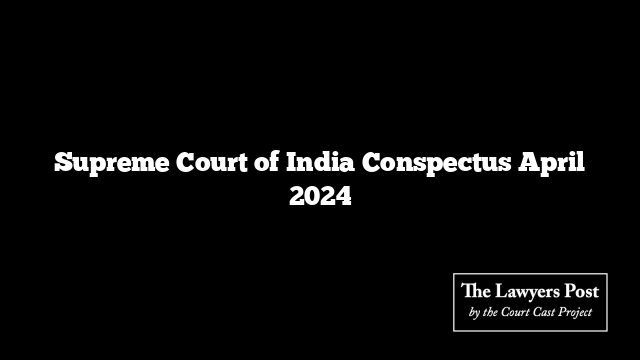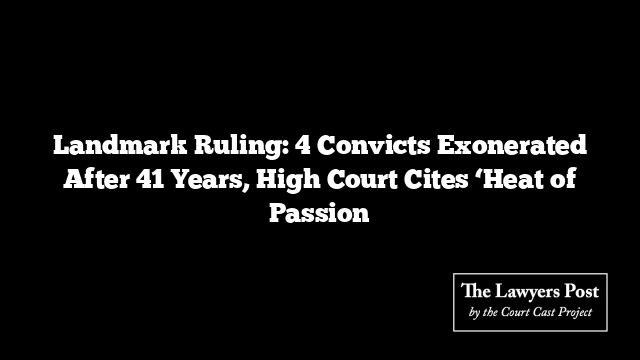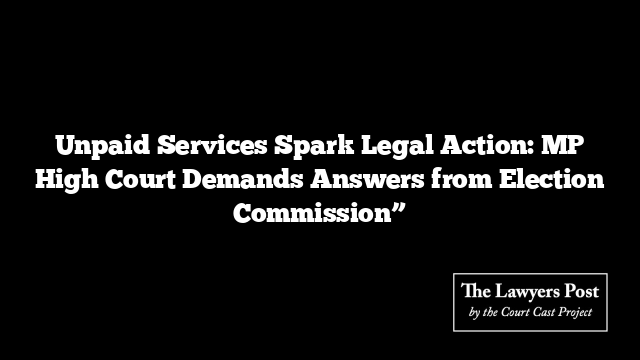| Level 9 Biz Pvt. Ltd. v. Himachal Pradesh Housing and Urban Development Authority |
The Supreme Court held that the collusion between parties in the tender process amounted to an abuse of process of law. The impugned order permitting the execution of the project was quashed due to gross irregularities confirmed by an independent committee. The respondent was directed to initiate a fresh tender process in accordance with the law. |
| Krishnadatt Awasthy v. State of M.P. |
The Supreme Court delivered a split verdict regarding the appointment of Shiksha Karmis in Madhya Pradesh, indicating differing judicial opinions on administrative actions. |
| Sachin Kumar v. State of Uttarakhand |
The Court emphasized that states must ensure the continuation of their old panel of advocates for at least six weeks to avoid disrupting court proceedings following a change in political power. |
| Delhi Metro Rail Corporation Ltd. v. Delhi Airport Metro Express Pvt. Ltd. |
The Court clarified the scope of interference under Sections 34 and 37 of the Arbitration and Conciliation Act, 1996, emphasizing that arbitral awards can only be set aside on specific grounds of ‘patent illegality’ and that the constitutional right under Article 136 to grant Special Leave to Appeal remains intact. |
| A. Duraimurugan Pandiyan Sattai @ Duraimurugan v. State |
The Court upheld the cancellation of bail on grounds of misuse of liberty but clarified that participation in protests and strong views expressed do not necessarily violate bail conditions. |
| Shoma Kanti Sen v. State of Maharashtra |
The Court ruled that a plea for bail, although not explicitly stated, is implicit in an appeal against a judgment that refused bail. It emphasized that bail applications should be considered on their substantive merits rather than the manner in which reliefs or prayers are framed. |
| Navneet Kaur Harbhajansing Kundles v. State of Maharashtra |
The Supreme Court reinforced that the verification of caste certificates falls within the exclusive domain of the Scrutiny Committee, whose decisions should not be interfered with unless they are perverse. |
| State of Gujarat v. Paresh Nathalal Chauhan |
The Court highlighted the limited ‘good faith’ defense available to statutory functionaries under Section 157 of the Central Goods and Services Act, 2017, indicating that good faith must be adjudicated based on specific facts and circumstances. |
| Ajay Ishwar Ghute v. Meher K. Patel |
The Court emphasized the necessity of including all necessary parties in legal proceedings and stated that orders passed without hearing all affected parties are illegal. |
| Sharif Ahmed v. State of Uttar Pradesh |
The Supreme Court ruled that non-bailable warrants should not be issued routinely and emphasized the need for detailed entries in chargesheets under Section 173(2) of the Code of Criminal Procedure, 1973. |
| Mukhtar Zaidi v. State of Uttar Pradesh |
The Court held that a Protest Petition should be treated as a private complaint under Section 190(1)(a) of the CrPC and the procedure prescribed in Chapter XV should be followed. |
| Pankaj Singh v. State of Haryana |
The Court stated that the essential requirement for the presumption of the absence of consent under Section 114A of the Evidence Act is that the prosecution must be for the offense of rape under Section 376(2). The presumption does not apply if the charge under Section 376(2) is not framed. |
| Jyoti Devi v. Suket Hospital |
The Supreme Court enhanced the compensation for medical negligence, emphasizing that compensation should make good the loss suffered and take the receiver back to a position as if the injury had not occurred. |
| Annapurna B. Uppin v. Malsiddappa |
The Court held that commercial disputes are outside the purview of the Consumer Protection Act, 1986, and such disputes should be resolved in civil courts. It also stated that a complainant who is a partner in a firm cannot maintain a complaint for disputes related to the partnership. |
| Yash Raj Films Pvt. Ltd. v. Afreen Fatima Zaidi |
The Court ruled that promotional trailers do not create a contractual obligation for the content shown in the trailer to be present in the final film, thus dismissing the complaint for deficiency of service. |
| Rajco Steel Enterprises v. Kavita Saraff |
The Supreme Court stated that the dishonoring of a cheque does not necessarily establish an enforceable debt or liability, emphasizing the need for clear proof of such an obligation. |
| State of Kerala v. Union of India |
The Court denied interim relief to the State of Kerala seeking an injunction against the Union of India regarding borrowing limits, highlighting the need for a prima facie case, balance of convenience, and irreparable injury. |
| Prem Raj v. Poonamma Menon |
The Supreme Court stated that civil court judgments are binding on criminal courts in related matters, thus quashing the Section 138 proceedings under the Negotiable Instruments Act for being a civil matter already adjudicated. |
| Mahakali Sujatha v. Future Generali India Life Insurance Company Ltd. |
The Court ruled that the burden is on the insurer to prove non-disclosure of material facts in insurance contracts and emphasized that policy repudiation must be justified with substantial evidence. |
| Vinod Kumar v. Union of India |
The Court held that long-term continuous service and selection through a regular process warrants reclassification from temporary to regular status, entitling employees to regularization. |
| Meher Fatima Hussain v. Jamia Milia Islamia |
The Court directed the reinstatement of teachers selected through regular processes, emphasizing that university actions contrary to UGC directions are unjust and violative of Article 14 of the Constitution. |
| Sandeep Kumar v. GB Pant Institute of Engineering and Technology |
The Supreme Court reinstated the appellant, ruling that termination without disciplinary enquiry violates principles of natural justice. |
| Ballu @ Balram @ Balmukund v. State of Madhya Pradesh |
The Court quashed the High Court’s reversal of acquittal, stating that interference with acquittal is unwarranted unless findings are perverse or impossible, and emphasized that suspicion, however strong, cannot replace proof beyond a reasonable doubt. |
| Manikandan v. State by the Inspector of Police |
The Court acquitted the appellants, noting that the evidence was likely tutored by the police, and emphasized the importance of genuine evidence in criminal convictions. |
| Ravishankar Tandon v. State of Chhattisgarh |
The Supreme Court held that the chain of circumstantial evidence must be complete and consistent with only the guilt of the accused, and ruled that the prosecution failed to prove the case beyond a reasonable doubt. |
| Babu Sahebagouda Rudragoudar v. State of Karnataka |
The Court highlighted that disclosure statements under Section 27 of the Evidence Act must lead to the discovery of a fact not previously known to anyone other than the accused, and ruled the prosecution failed to meet this standard. |
| Sharif Ahmed v. State of Uttar Pradesh |
The Supreme Court detailed the requirements for chargesheets under Section 173(2) of the CrPC and emphasized the proper procedures for issuing non-bailable warrants, treating Protest Petitions, and handling evidence in criminal cases. |
| Navneet Kaur Harbhajansing Kundles v. State of Maharashtra |
The Supreme Court emphasized the exclusive domain of the Scrutiny Committee in caste certificate verification and ruled that courts should not interfere unless decisions are perverse. |
| M.K. Ranjitsinh v. Union of India |
The Court emphasized the constitutional duty to protect the environment under Articles 14, 19, 21, 48A, and 51A(g), and highlighted the fundamental right to a healthy environment and the adverse effects of climate change. |
| State of Telangana v. Mohd. Abdul Qasim |
The Supreme Court stressed the significance of forest conservation under Article 14 and ruled against the High Court’s interference in reserved forest land declared under the Forest Act, 1967. |
| Purni Devi v. Babu Ram |
The Court allowed the exclusion of time spent in pursuing a matter in a court without jurisdiction when computing the limitation period for an execution application, thus permitting the application. |
| Union of India v. Jahangir Byramji Jeejeebhoy |
The Court emphasized that delay in legal proceedings must be justified by reasonable diligence and the appellants failed to prove such diligence in this case. |
| Hanif Ansari v. State (Govt of NCT of Delhi) |
The Supreme Court referred to a larger bench the issue of whether the failure to submit an FSL report with the chargesheet entitles the accused to default bail under the NDPS Act. |
| Najmunisha v. State of Gujarat |
The Court ruled that search and seizure operations under the NDPS Act must comply with Sections 41 and 42, and statements made to empowered officers under Section 67 are not admissible as confessional statements. |
| State of West Bengal v. Jayeeta Das |
The Supreme Court clarified that the Chief Judge cum City Sessions Court has jurisdiction to extend remand beyond 90 days under Section 43D of the UAPA when a special court is not designated. |
| Shamim Khan v. Debashish Chakraborty |
The issue of whether prior sanction is required under Section 197 CrPC for prosecuting a public servant under Section 504/506 IPC was referred to a larger bench. |





